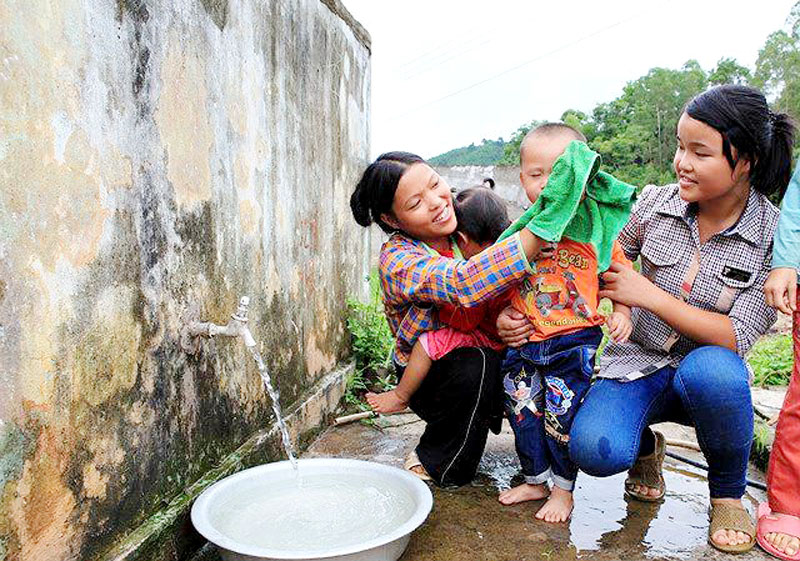
(HBO) - The resolution released at the 15th Hoa Binh Party Congress for the 2015-2020 tenure sets a target of 95 percent of rural locals accessing clean water by 2020. To this end, over the years, the province has focused on implementing many programmes and projects to mobilise resources for rural water supply and environmental sanitation.
Over the years, thanks
to support of the State, locals in Giap Dat commune of Da Bac district have
enjoyed clean water.
One of the key programmes in the field that has been sped up
is an outcome-based project on expanding the coverage of rural sanitation and
clean water for the 2016-2020 period, using loans from the World Bank.
The National Target Programme on New-Style Rural Area has
defined the focus of investment in realising the target of raising the ratio of
rural people accessing clean water in communes covered by the programme.
After years of overcoming difficulties, the national target
programme on clean water and rural environmental sanitation has gained
considerable achievements. The ratio of rural people accessing clean water
reached 91.5 percent, while 85.6 percent of poor households enjoyed clean
water.
The rate of schools having clean water and hygienic toilets is
80.9 percent, while the rate of communal health care station with clean water
and hygienic toilets is 90.1 percent.
The resolution of the 15th provincial Party Congress sets
that by 2020, 95 percent of rural people enjoy clean water, 75 percent of rural
households have hygienic toilets, 100 percent of schools and health care
stations have hygienic toilets and clean water works, and the majority of regional
health care stations are equipped with hygienic toilets, water supply work and
hand cleansing equipment.
Compared to the goals, the province has nearly completed the
target of the ratio of rural people accessing clean water.
According to the provincial Party Committee, at the end of
2018, six targets set in the resolutions were completed and exceeded, while
among the remaining nine targets, the goal of the ratio of rural people
accessing clean water was nearly finished. This is a good condition for the
province to complete and surpass the target in the future, thus improving the
public health and people’s living conditions, contributing to the sustainable
socio-economic development in the locality./.
The Standing Board of the Hoa Binh provincial Party Committee has agreed in principle on a proposal by the Standing Board of the Party Committee of Hoa Binh city to gather feedback on the city’s 1:2000 zoning plan, which forms part of its broader urban development strategy.
Hoa Binh province has made notable progress in public administration reform and digital government development, with the satisfaction index among citizens and businesses reaching over 84%, according to recent government evaluations.
Thanks to great efforts by local authorities in recent times, the governance and public administration performance of Mai Chau district has been significantly improved.
In the afternoon of June 6, the Party Committee, the People's Council, the People's Committee and the Fatherland Front of Lac Son district solemnly held a meeting to celebrate the 139th anniversary of the district's founding (1886–2025) and the 79th anniversary of the establishment of the district's Party Committee (1946–2025). There was the attendance of Mr. Bui Van Thang, the Vice Chairman of the Provincial People's Council; Mr. Quach Tat Liem, the Vice Chairman of the Provincial People's Committee; Ms. Dang Bich Ngoc, the Deputy Head of the National Assembly Delegation of the province; as well as the former leaders of the province and district through various periods, who are the natives of the district.
Implementing the Politburo’s Resolution No. 57-NQ/TW on breakthroughs in science – technology, innovation, and digital transformation is a golden opportunity for the northern mountainous province of Hoa Binh to renew growth model, improve competitive edge and shorten digital gap.
Resolution 57-NQ/TW, issued by the Politburo on December 22, 2024, identifies sci-tech, innovation, and digital transformation as strategic breakthroughs to build a developed and prosperous nation. In Hoa Binh province, this spirit is not just a slogan, it’s being put into action through concrete initiatives that form a "new development triangle”: digital citizenship, digital economy, and digital administration.



